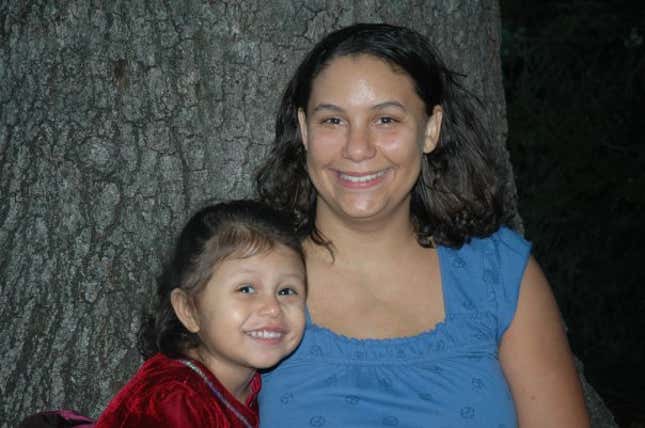
This story was originally published by Mother Jones Magazine.
A week before Christmas last year, Kerry King helped three of her children build gingerbread houses in a prison visitation room in Oklahoma. King wanted to make the holiday special for the kids, even under the circumstances. But as the Black 35-year-old spread frosting on a graham cracker while dressed in her orange jumpsuit, her hair braided for the occasion, the mood still felt bittersweet. Since she was incarcerated six years earlier, her kids could only visit once a month, and soon it would be time to say goodbye.
“Do you love me?” Lilah, 10, the most outgoing of King’s children, asked her mother as the visit was ending.
“Of course I do,” King answered.
Lilah thought for a moment, her brown eyes serious, and then said something that caught King off guard. “Do you still love him?” she asked. “Because if you still love him, I’ll never forgive you.”
King’s heart dropped. Her ex-boyfriend had abused them both, years ago. He was the reason King was in prison now. But her daughter had never said anything like that to her before. And there wasn’t enough time to have the long conversation they both craved.
Back in her cell, King agonized over whether a letter to Lilah would suffice. She had been mothering her children over letters and phone calls for too long. No matter what, King wanted to tell her daughter, I love you more than I could have loved anyone else, any man. And you should never, ever have to even consider whether I do.
“I am not guilty,” King had said to me over the phone, months before the Christmas visit. “I just wanna go home. I wanna see my kids so bad. It kind of eats you up.”

King has spent countless nights tossing and turning in her cell, replaying the night that pulled her away from her family. (The following descriptions are confirmed in court records and testimony.)
In January 2015, in the small yellow house she shared in Tulsa with her boyfriend and a roommate, King had been bathing Lilah, then 4, when she saw bruises on the girl’s legs and arms. Purdy “was mean,” Lilah said, sitting in the soapy water. John Purdy was King’s boyfriend at the time; he’d recently lost his telemarketing job and sometimes watched Lilah while King worked at a gas station. He’d been physically abusing King for more than a year, often high on heroin, which he’d recently forced her to try. But she had never seen him harm her children. When she asked about the bruises, he claimed Lilah had slipped on the ice.
Two days later, King woke up in the middle of the night and noticed Purdy was not in bed. She was groggy—he had ordered her to shoot up again—but saw a light on in Lilah’s bedroom. When she entered the room, Purdy was holding Lilah’s shoulders, with his fingers wrapped around her little neck. He said they were having a pillow fight, but Lilah whimpered beneath his grasp. “I thought he was hurting her,” King later told detectives. So she tried to free her daughter the only way she knew how, by clenching her fist and punching Purdy in the face. What makes you think you can hit me? she remembers him telling her, turning toward her. He slammed her head against a wall, insisting Lilah needed to be spanked.
King agreed to hold Lilah down like Purdy demanded, hoping that if she complied it would be over faster. But when she saw how hard his blows were, she threw her body over her daughter’s, receiving Purdy’s belt lashes on her own back. Purdy pulled King off Lilah, and King tried to run out of the house to get help from the neighbors or the police—but he blocked her at the door. You ain’t going nowhere, she recalls him saying. “I was scared. I didn’t know what to do,” she later told me, adding that it felt like she “had been in chains.” Purdy dragged King to the master bedroom by her hair and threatened to kill her if she didn’t stay there. He reentered Lilah’s room and locked the door, leaving King outside, listening to her daughter’s cries.
Purdy held King’s phone in his pocket, making it hard for her to call for help. She begged him to come out of Lilah’s room, and then asked him to take a shower with her, anything to distract him. Around 6 a.m., he directed her to lie down in bed. Still high, King reluctantly fell asleep. When she woke up, he wouldn’t let her or her daughter leave the house.
It wasn’t until later that day, when a contractor came to work in the yard, that King’s housemate snuck out and asked the man to call 911. The police found Lilah in a locked room, sobbing. Bruises covered her forehead, cheeks, ears, and neck, and belt lashes cut into her back. Chunks of her curly brown hair were missing.
The police arrested Purdy. King, who had bruises on her own body, helped investigators take her daughter to a hospital. Then she returned home, exhausted. But her nightmare was far from over.
Less than a week later, King was sitting inside in her pajamas when a police car pulled up to her house around 11 a.m. Two white officers asked her to come with them for an interview. “I didn’t want him to hurt my baby,” she told them. “I was trying to prevent this.”
But the officers didn’t buy it. They wanted to know why King waited so long without seeking help for her daughter. Why had she held Lilah down for the beating? Why didn’t she call 911?
They arrested King and put her in jail, where she would stay for more than a year awaiting trial. They accused her of child neglect and permitting child abuse. By the time it was all over, though she had never laid a hand on Lilah, she would be sentenced to 30 years in prison—12 more years than Purdy, the man who had assaulted both her and her daughter.
Next: In Part 2 of this series, find out why Kerry King got more prison time than her abuser.

